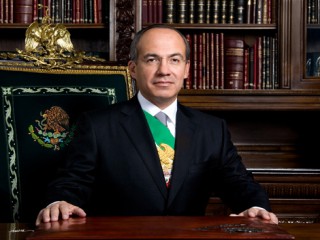
Felipe Calderón biography
Date of birth : 1962-08-18
Date of death : -
Birthplace : Morelia, Mexico
Nationality : Mexican
Category : Politics
Last modified : 2010-07-22
Credited as : Politician and lawyer, President of Mexico, World's political leader
1 votes so far
One of two frontrunners in Mexico's hotly contested 2006 presidential race, Felipe Calderón was a member of the conservative National Action Party (PAN). His leading rival for the top spot was nearly his polar opposite - the leftist former mayor of Mexico City, Andres Manuel Lopez Obrador. The election results were too close to call until July 6 - nearly four days after the close of the polls - with Calderón winning by a narrow margin. Although the Federal Electoral Tribunal declares the official president-elect, Luis Carlos Ugalde, president of the Federal Electoral Institute announced Calderón to be the next president of Mexico, and in September, Mexico's supreme electoral court unanimously voted to declare Calderon the official winner of the July 2 presidential election.
Education and Politics
Calderón was born on August 18, 1962 in Morelia, Mexico. His father, Luis Calderón Vega, was a founder and important member of PAN. The son followed in his father's footsteps, beginning as a leader in PAN's youth movement and then unobtrusively rising through the party ranks. He received a law degree from Escuela Libre de Derecho and a master's in economics from the Autonomous Technical Institute, both located in Mexico City. He also earned a master's degree in public policy from the Kennedy School of Government at Harvard University.
Despite his impressive academic credentials, Calderón spent little time in the private sector. Instead, he entered politics in 1988, at the age of 26, by winning a seat in Mexico City's assembly. He moved on to gain a seat in Congress, then lost a bid for governor of Michoacan, his home state, in 1995. Meanwhile, he continued to progress within PAN's hierarchy, eventually becoming the party's national president and leading it to three gubernatorial wins and over a dozen mayoral victories. He also dipped briefly back into the private side to head up Banobras, a development bank. And Mexico's political landscape was changing.
In 2000, Vicente Fox ended a 71-year reign of one-party rule by the Institutional Revolutionary Party (PRI) with his election to Mexico's presidency. A fellow PAN member, Fox's candidacy was supported by Calderón. Two years later, Calderón was tapped to join Fox's cabinet as secretary of energy. It was a relatively short honeymoon however, as Calderón's open presidential aspirations caused him to resign the position in 2004. But he did not resign his ambitions.
Presidential Hopeful
When Calderón began to seek his party's nomination for the 2006 presidential election, he had neither the full support of the president or much name recognition. Unimposing and sedate, he was seen by many as the academic that he fundamentally was. He capitalized on this lack of innate charisma by campaigning on a platform of honesty in a country with a long history of corrupt public officials. Still, after securing the PAN nomination, he remained behind in the polls. A slight change in tactics and more vigorous methods changed all that.
Calderón's prime adversary in the campaign was the leftist former mayor of Mexico City, Andres Manuel Lopez Obrador. While Obrador's populist leanings endeared him to the poor, Calderón's free-market vision made him a favorite of the wealthy. And both candidates purported to make jobs a top priority. So, perhaps recognizing that his natural constituency was unlikely to alter, Calderón started to actively add the support of the middle classes. One way in which he did this was through ads attacking Obrador. While some considered the means offensive, they were effective. Calderón and Obrador, who had gotten his own digs in by then, were neck and neck by the spring of 2006.
The elections were held on July 2, 2006. Once considered the favorite by a wide margin, Obrador's victory was no longer a certainty. After the votes were counted and announced on July 6, it was apparent that Calderón's views had made an impact. For his part, the fortunate son of his father's party succintly stated his reason for running to James C. McKinley of the New York Times, as quoted in the Latin America News: "I don't want Mexico to go backward."
The supreme Mexican electoral court dismissed Andres Manuel Lopez Obrador's claims of fraud in the election, and the decision effectively confirmed Calderon as the winner of the election, although the court had not yet formally declared him president-elect. In September, however, Mexico's supreme electoral court unanimously voted to declare Calderon the official winner of the July 2 election.
On January 9, 2007 Calderon launched a new universal health insurance plan which will cover all children born during his time in office.
August 7, 2008: Calderon proposed that kidnappers be sentenced to life without parole for kidnapping children, for especially violent kidnappings, or for kidnappings that resulted in the death of the victim.
















